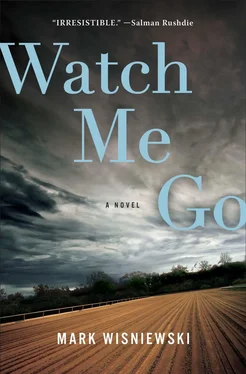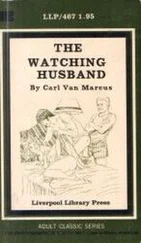Mark Wisniewski
Watch Me Go
AMONG DOUGLAS “DEESH” SHARP’Swell-guarded thoughts was the idea that his public defender, Lawrence Gerelli, might win more often if he’d now and then iron a shirt. Worse, Gerelli had a tendency to show his hand by letting himself go sour-faced, and here Gerelli was, doing that again as he sat across the table in the small white room and said, “Mostly, Mr. Sharp? You have a belief problem.”
“As in you don’t believe me?” Deesh asked.
“As in we need twelve jurors to believe you, and they’re going to be hard to find.”
“So you’re saying plea bargain.”
“The plea bargaining’s already begun, Mr. Sharp. The prosecution here in the Bronx is talking about sending you back to Pennsylvania — where, unlike here, people are still relatively comfortable with the death penalty.”
And there was that sour face again, and Deesh found himself leaning back in his folding chair to say, “Man, nobody gets to twelve without first having two in this room.”
Gerelli began gathering his notes and electronics. “I’m late for an arraignment,” he said. He snapped closed and yanked up his briefcase. “You want life here in New York, Mr. Sharp, just say the word and I’ll bust my ass to get that for you.” He glared at Deesh, who glared back. “You still want to go for broke, we’ll talk about building cases next time.” He walked out, and the door swung closed.
And right away, Deesh felt less alone. He flattened his hands beside the bolted steel ring his wrists were cuffed to. He appreciated this small white room, its cleanliness and brightness, the safety implied by its particular silence.
Then, from behind the room’s white door, there was a cough. And a knock. The door opened, and just behind the guard stood someone short, so this wasn’t who Deesh had hoped — it wasn’t his son — and the guard stepped aside and Deesh saw the face, a woman’s face, a way-too-fine, almost dollish face on a very short, white, deeply suntanned young woman whose curves struck Deesh as impossibly sweet, too.
“Who the hell is this?” he asked the guard.
“She signed in,” the guard said.
The cop’s wife? Deesh thought, but the woman eyed the handcuffs so intently there was no way she hung with cops. Deesh felt himself holding his breath while she stood behind the chair Gerelli had left, braced as if she were set to run off if need be.
“So you’re the infamous Deesh,” she said, in her own kind of sadness.
“All day.”
“I’m Jan Price.”
“Means nothing to me.”
“I knew Tom Corcoran personally,” she said, as if this explained everything. “The jockey,” she added. “And there are things about his gambling I can testify about.”
Bullshit, Deesh wanted to say, but she looked away quickly, at one of the bright white walls, brow knitted, maybe about to cry, maybe not.
She said, “But I need to know you didn’t kill those other two guys.”
She kept on looking at that wall.
“I didn’t kill anyone,” Deesh said, and he knew, given his experience with whites this beautiful, that right about now was when the ugliness in her would show.
“Then why are you in here?” she asked.
Her eyes met his, but he was already shaking his head, as if to suggest that, no, he would not have this conversation, though now here he was, also asking, “Isn’t that obvious?”
And she said, “No.”
He raised a cuffed forearm, pointed at it best he could.
“But Deesh,” she said, “you’re not the only black guy out there. I mean, for some reason, they arrested you. And what’s eating me up is that I happen to know that, when it comes to Tom Corcoran, you’re as innocent as a colt learning to walk. But if you’re a killer anyway, why should I help you?”
And it was only now that Deesh realized he could actually care about this woman — in that same solid way he’d once cared about his state champion teammates — because here he was, saying to her, “Ms. Price, you’re asking me to tell you a very long story.”
And she said, “Not necessarily, Deesh. I’m asking you to tell me the truth.”
NINE TIMES OUT OF TENit’s a woman who calls Bark to answer his classified ad in the Westchester Pennysaver , and sometimes when we pull up to her yard in his pickup, she’s outside waiting for us. Sometimes she even has something inside for us to eat, which, besides needing money, is why James and I never ask Bark if he wants our help. We just get in his truck and hope he lets us go.
But the truth, Jan, is that on the morning he drives us north of Poughkeepsie, no woman, or anyone, is waiting outside. Maybe this has to do with the five hundred dollars this woman offered — she doesn’t feel the need to be friendly beyond that. Or maybe she’s with the junk that needs to be hauled. Anyway Bark pulls off the country road into her driveway, which drops through her uncut lawn toward her shabby yellow house, and we all get out, Bark headed to knock on her front door.
“Hey,” I hear from the left-hand side of the house, and I turn but see no one. “Down here,” the voice calls, and there, crouched near an open crawl space hole, is a woman about as dark as me, maybe five years older.
“Over here, Bark,” I shout, and Bark makes his way down the porch, then over to her, James and I lagging behind to let her know he’s boss.
“I took care of the rest myself,” she says, and Bark kneels beside her, then pokes his head and a good half of him into the crawl space. He stays in there for a while, making sure, I figure, that we can do what needs doing. Then he’s back out, and he stands, slapping dirt off his knees.
“Just that oil drum?” he says.
“Yeah,” she says.
“I thought you said there was a bunch of stuff,” he says.
“No,” she says. “Just that.”
“What’s in it?” he asks.
“I have no idea,” she says, but she’s scratching her arm and keeps scratching it; if she’s not flat-out lying, she’s more than a little nervous.
“Because the thing is,” Bark says, “I can’t just take a drum like that to a dump without them asking what’s inside.”
“Then don’t take it to a dump,” she says. “Just, you know, get rid of it.”
Bark grabs his unshaven jaw, considering. Probably he’s stumped by why a sister is living more than an hour north of the city; plus it doesn’t make much sense that any woman living in a house this shabby could have five hundred dollars, let alone give it to us to haul off a drum with nothing bad in it. It crosses my mind this woman loves some guy who’s given her five hundred to get rid of the drum, some dude, maybe a white one, that she has it bad for and cheated with — and that inside the drum is this man’s wife. But all kinds of things are crossing my mind, including how I could use five hundred dollars divided by three.
“How ’bout a thousand?” the woman says.
Here’s where all of us, including her, gaze off at her uncut lawn, the dandelions and weeds in it, some of them pretty enough to call flowers. We gaze our separate ways for a long time, letting whatever truth of what’s going on sink into us while we play as if it isn’t, and I feel my guts work their way higher toward my lungs, threatening to stay there if Bark agrees. But there’s a lot I could do with my share of a thousand, especially since I’m used to walking away from these jobs with fifty at most. I could eat more than apples and white bread and ham. I could start saving for a truck of my own — to haul things for pay myself.
Читать дальше












